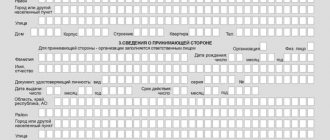9.11.20
M. Poluektov / AK Poluektova and partners
It must be taken into account that after writing this article, the Constitutional Court of the Russian Federation adopted resolution No. 15-P dated April 26, 2021 (I. Revkov’s case), which significantly limited the executive immunity of a single residence.
After which, the Supreme Court of the Russian Federation adopted ruling No. 303-ES20-18761 dated July 26, 2021, which established the basic principles for the provision of replacement housing. Brief comments on these judicial acts can be found here and here.
As is known, in relation to the only residential premises suitable for permanent residence, not encumbered by a mortgage ( hereinafter referred to as the only housing
), executive immunity applies. In the event of bankruptcy of a citizen, such only housing is excluded from his bankruptcy estate (clause 3 of Article 213.25 of the Bankruptcy Law).
Executive immunity is based on paragraph 2, part 1, article 446 of the Code of Civil Procedure of the Russian Federation, according to which “Foreclosure under executive documents cannot be applied to the following property owned by the debtor citizen: residential premises (parts thereof), if for the citizen - the debtor and members of his family living together in the premises owned, it is the only premises suitable for permanent residence, with the exception of the property specified in this paragraph, if it is the subject of a mortgage and can be foreclosed on in accordance with the legislation on mortgages.”
In practice, fierce disputes arise between creditors and the debtor over whether or not to exclude from the bankruptcy estate this or that residential premises owned by the debtor.
Such disputes arise when it turns out that the debtor has:
— several residential premises of different prices;
- one residential premises, but too large in area or cost;
- one residential premises, and the property of a member of his family - another.
The law does not directly determine how to resolve such disputes, leaving it up to the judicial system.
The Plenum of the Supreme Court of the Russian Federation, in paragraph 39 of Resolution No. 45 of October 13, 2015, formulated a general principle that courts must observe when considering bankruptcy cases of citizens: “courts must take into account the need to ensure a fair balance between the property interests of creditors and the personal rights of the debtor (including his rights to a dignified life and personal dignity).”
Based on this principle, lower courts have developed certain approaches to resolve such disputes. Let's look at them using the three typical situations above as examples.
In paragraph 3 of the Resolution of the Plenum of the Supreme Court of the Russian Federation dated December 25, 2018 N 48 “On some issues related to the peculiarities of the formation and distribution of the bankruptcy estate in cases of bankruptcy of citizens” it is stated: “if the debtor has several residential premises owned by him , the premises in respect of which executive immunity is granted are determined by the court hearing the bankruptcy case, based on the need to both satisfy the claims of creditors and protect the constitutional right to home of the debtor citizen himself and his family members, including dependent minors , elderly, disabled people, providing these persons with normal living conditions and guarantees of their socio-economic rights.”
When determining which residential premises should be given the status of the only home, the courts, as a rule, are guided by the following.
What property can be seized for debts?
It is allowed to seize what is not prohibited. There is no point in listing everything, but here are a few interesting options:
- Pets. By law, they are considered property of the Civil Code of the Russian Federation Article 137. Animals, so they are subject to seizure and subsequent sale. For example, in the Stavropol Territory, the owner was arrested for debts. In the Stavropol Territory, a cat was arrested for debts. In 2015, a bill was introduced into the State Duma. The Duma proposed banning the arrest of pets, which would prohibit this, but it did not find support.
- Fence. In the Stavropol region, bailiffs arrested a fence in the Krasnodar region, a fence made of corrugated sheets. The fence was dismantled and sold at auction.
- Hay. Two hundred haystacks ended up “Instead of 200 thousand rubles - 200 haystacks”: bailiffs seized hay from an alimony defaulter and put it under arrest because its owner, a farmer, did not pay alimony.
- Door. The debtor made it himself and wanted to install it instead of the old one. But before the South Ural bailiffs had time to arrest the door.
In general, nothing is safe. Fortunately, you can Federal Law No. 229-FZ of October 2, 2007, choose for yourself what you need least and offer it for implementation. But only if the price of these things is sufficient to pay off the debt.
Providing alternative living space
Basically, government provision of alternative housing occurs upon eviction from municipal housing . This is possible in the following cases:
- A person is evicted for utility debts, but in court, he proves that they arose for reasons beyond his control (serious illness, loss of job). They can evict him from his only housing only if he is provided with an alternative, for example, they will offer him a smaller room in a municipal hostel (Part 1 of Article 90 of the Housing Code of the Russian Federation).
- If a person has been deprived of parental rights and the court prohibits him from living with a child in the same living space, he can be evicted to another municipal housing that will meet the living standards (Part 2 of Article 90 of the Housing Code of the Russian Federation).
- If the housing is recognized as unsafe and “for demolition” (Article 86 of the Housing Code of the Russian Federation).
- If municipal housing is considered dilapidated and undergoes urgent major repairs, residents are temporarily evicted from such premises. If they have nowhere to live at this time, according to clause 1, part 2 of art. 106 of the Housing Code of the Russian Federation, they are required to be provided with temporary alternative housing from the flexible fund.
According to Art. 32 of the Housing Code of the Russian Federation, a situation may arise when a residential building is recognized as “an object for demolition” even if it is not in disrepair. For example, the state urgently needed to develop the site on which the house is located for other more important needs. Based on this article, even one’s own, privatized housing can be confiscated, and even if it is the only one.
The state is obliged to provide residents with alternative, equivalent living space. If they refuse to accept the object offered to them, according to Art. 32 of the Housing Code of the Russian Federation, they are simply compensated for the market value of the “selected” apartment.
Video on the topic
Debt collectionDebtsOnly housing
Author:
Vladislav Kvitchenko
CEO . Practicing lawyer in the field of bankruptcy of individuals. persons Since 2015, she has been successfully handling insolvency cases. Vladislav is brilliantly versed in bankruptcy law, gives expert comments on legal situations and actively publishes in specialized publications.
What property cannot be seized for debts
The list is quite long. It includes the Code of Civil Procedure of the Russian Federation Article 446:
- The only housing and the plot below it. An exception is if an apartment or house serves as collateral for a mortgage loan. Also, in rare cases, it is allowed to sell the only home when the amount of debt seriously exceeds the value of the property.
- Furniture, clothing, equipment necessary for life. That is, your bed, linen and stove will not be taken away from you. But you’ll have to say goodbye to the game console, mink coat and ruby ring.
- Property with which the debtor earns money. They won’t take away a sewing machine from a seamstress, a car from a taxi driver, or a laptop from a programmer. True, if an item costs more than 100 times the minimum wage (currently the minimum wage is 12,130 rubles), then they can still confiscate it.
- Farm animals, birds, rabbits and bees, food for them and buildings where they live. But only if they are kept for personal purposes. If animals and insects are used in business activities, they are subject to confiscation.
- Seeds for sowing.
- Products and money in the amount of the subsistence level, taking into account the debtor himself and his family members.
- Fuel for cooking and heating.
- Facilities necessary for a disabled person.
- Prizes and state awards.
Our services and prices
Free consultation
0 ₽
- You talk about your problem, ask questions;
- The lawyer clarifies the necessary information, analyzes the situation, tells options for the development of events;
- Together you choose a profitable option - bankruptcy, refinancing, just a complaint against debt collectors or a bank;
- The lawyer tells you how to prepare, where to get documents, and what to do in your case.
Read more
Out-of-court bankruptcy in MFC on a turnkey basis
25 160 ₽
- Verification and recording of debts and proceedings in the FSSP, assessment of property and contestability of transactions for 3 years
- Drawing up an application and list of creditors
- Filing a bankruptcy application to the MFC by proxy
- Working with banks and collectors - notification of refusal to cooperate, complaints to the prosecutor's office and the FSSP in case of violations
- Representation of interests by a lawyer in case of objections from creditors
- Six months later, you receive a decision from the MFC to declare you bankrupt and write off your debts.
Read more
Turnkey bankruptcy of an individual
from 8,460 ₽/month.
- Filing a bankruptcy petition
- Collection of necessary documents
- State duty and remuneration of the arbitration manager
- Representation of interests by a lawyer at a court hearing on the introduction of bankruptcy proceedings
- Full support of bankruptcy proceedings by financial managers
More details
Unauthorized occupation of housing.
If an individual lives in an apartment illegally, you can easily expel him by contacting law enforcement agencies or the court.
Law-abiding citizens are most concerned about the issue of debts to banks and microfinance organizations for loans, borrowings and mortgages. So, under the new law, is it possible to be left without the only home due to debts? Theoretically, under a number of circumstances, this is possible, but rarely in judicial practice such cases end in loss of living space. However, it is not worth accumulating debts, hiding from the bank collection service and bailiffs, hoping for the protection of the law. It’s better to deal with the debt trap and restore peace of mind to yourself and your family.
The debtor's only home: the Supreme Court will clarify the rules for eviction and exchange
In May 2021, Dmitry Struzhkin was declared bankrupt and the sale of property was ordered. The court excluded the debtor's only home, a two-room apartment (40 sq. m.) in the center of Izhevsk, from the bankruptcy estate. Lenders tried to challenge this decision because they considered the housing too large. Struzhkin does not have dependent children, he is not married, he did not actually live in the apartment, so a smaller room would be enough for him. Almost two years later, in September 2019, at a meeting the creditors decided that one of them would provide the debtor with an apartment in return that was half the size (19.8 sq. m.), but in a different area, not in the center, worth 850,000 rubles . At the same time, the debtor’s two-room apartment was valued at from 1.6 to 2.2 million rubles. They planned to use the difference in cost to pay creditors.
Various positions
The debtor complained to the Arbitration Court of the Udmurt Republic, considering that the decision of the creditors' meeting violated his property rights. He pointed out that the only housing has “immunity” and cannot be sold. The first instance did not agree with the creditors that a two-room apartment can be considered “luxurious”; it does not exceed the minimum reasonable level of security for citizens living in the republic. The court granted Struzhkin’s application in full.
Bankruptcy of citizens: when the only housing will be taken away
The appeal turned out to be of a different opinion. The court considered that the living space standard was set at 13.3 square meters. m per person (Article 50 of the Housing Code), therefore the replacement apartment does not violate the property rights of the debtor. It is located within the city, a few minutes from transport stops. The court agreed with the creditors that the debtor would be provided with the necessary conditions, and the creditors would receive payment. Later, the decision was “updated” by the district court.
Then Struzhkin appealed to the Supreme Court, pointing out that due to the appeal and cassation approach to resolving the dispute, he had actually lost his only home. In his opinion, the courts incorrectly applied the provisions of Art. 446 Code of Civil Procedure (property that cannot be foreclosed on under executive documents). It does not provide guidelines for determining housing as being reasonably adequate. Judge of the Supreme Court Denis Kapkaev, having considered the cassation appeal, decided to send it along with the case for consideration to the economic board (case No. 309-ES20-10004), the meeting is scheduled for October 22.
What will the Armed Forces change?
The courts take opposing positions on the acquisition of another home for the debtor, says Evgeniy Zubkov from Infralex Infralex Federal Rating. group Arbitration proceedings (medium and small disputes - mid market) group Bankruptcy (including disputes) (high market) group PPP/Infrastructure projects group Land law/Commercial real estate/Construction group Digital economy group Antitrust law (including disputes) group Corporate law/Mergers and acquisitions (high market) group Family and inheritance law group Transport law group Pharmaceuticals and healthcare group Tax consulting and disputes (Tax consulting) group Tax consulting and disputes (Tax disputes) group Private capital group Criminal law. Some are flexible, believing that a single high-value property cannot remain “untouchable.” As a rule, the courts allow the sale of a single residence if it is more than 100 square meters. m, says Alexandra Ulezko, head of the bankruptcy group at AB Kachkin and Partners Kachkin and Partners Federal Rating. PPP group/Infrastructure projects group Land law/Commercial real estate/Construction Company profile. For example, in case No. A60-56649/2017, the court allowed the inclusion of a five-room apartment (147.3 sq. m.) in the bankruptcy estate. Other courts proceed from the fact that “executive immunity” in relation to a single home is absolute, so it is impossible to buy a “simpler” house. For example, the 16th AAS in case No. A63-12876/2017.
The Supreme Court explained when you can lose your last home
Often, courts refer to the lack of a legislatively established mechanism for the provision of alternative real estate, says Anton Krasnikov, partner at Sotheby's Law Firm ZAO Sotheby's Federal Rating. group Bankruptcy (including disputes) (high market) group Private capital group Arbitration proceedings (major disputes - high market) group Dispute resolution in courts of general jurisdiction Company profile. Although back in 2003, the Constitutional Court, in Determination No. 456-O, called on the legislator to specify the regulation established by Art. 446 of the Code of Civil Procedure (property that cannot be foreclosed on according to executive documents), and establish clearer criteria for the debtor’s residential premises that cannot be foreclosed on. But the legislator left the Constitutional Court’s comments without due attention, Zubkov believes. The bill was submitted to the State Duma, but it was rejected.
According to Zubkov, the determination made by the panel for economic disputes in the Struzhkin case will become some kind of guideline for lower courts in similar cases. Ulezko does not agree with this position.
I don’t think that Struzhkin’s case will bring any clarity to the issue of foreclosure on a single apartment. It is important that the dispute does not just boil down to the Supreme Court stopping the practice of acquiring “alternative” housing for the debtor.
Alexandra Ulezko, head of the bankruptcy group Kachkin and Partners Kachkin and Partners Federal rating. PPP group/Infrastructure projects Land law group/Commercial real estate/Construction Company profile
According to Zubkov, the issue should be resolved at the legislative level. The standards must also include the territorial location of the new premises. Ulezko believes that it is impossible to establish “universal rules for all occasions.” Everything must be determined individually. For example, depending on what region the debtor works and whether he works at all, where his family lives and where he lived for several years before bankruptcy. In this dispute, Ulezko notes, the debtor did not live in the disputed apartment. The Economic Board of the Supreme Court, perhaps, will find a balance between the interests of creditors and the debtor’s right to a single home, Krasnikov concluded.
It seems that the Supreme Court will cancel the judicial acts of the lower authorities, and the ruling of the court of first instance will remain in force, because the debtor’s housing cannot be called elite.
Evgeniy Zubkov, lawyer, dispute resolution practice Infralex Infralex Federal rating. group Arbitration proceedings (medium and small disputes - mid market) group Bankruptcy (including disputes) (high market) group PPP/Infrastructure projects group Land law/Commercial real estate/Construction group Digital economy group Antitrust law (including disputes) group Corporate law/Mergers and acquisitions (high market) group Family and inheritance law group Transport law group Pharmaceuticals and healthcare group Tax consulting and disputes (Tax consulting) group Tax consulting and disputes (Tax disputes) group Private capital group Criminal law
- Anastasia Sinchenkova
- Bankruptcy
- Supreme Court of the Russian Federation
What will they do with the property next?
He will be sold. How exactly depends on the price Federal Law dated October 2, 2007 N 229-FZ. Property with a total value of less than 30 thousand rubles can be sold by the debtor himself if both parties agree on its price. It is written down in the deed of seizure. If the property costs more than 500 thousand, then it will be sold at open auction in the form of an auction. Things that do not fall into both categories are sold by a specialized organization.
Part of the proceeds will be given to the creditor - in the amount of the debt specified in the writ of execution. Some will be collected by the bailiffs in the form of an enforcement fee Federal Law dated October 2, 2007 N 229-FZ. It is equal to 7% of the debt amount, but not less than 1 thousand rubles per person and 10 thousand per organization. The money will be transferred to the budget.
If the debtor voluntarily pays the debt within five days after receiving the order from the bailiffs, the enforcement debt need not be paid.
How to avoid the procedure?
Tenants can only protect themselves from eviction, which may occur due to their fault, as well as due to non-compliance with the terms of the social tenancy agreement. In order to avoid eviction you must :
- pay utility bills on time;
- maintain normal relations with neighbors, do not cause inconvenience to anyone with your behavior;
- keep your home clean and not unsanitary;
- treats property with care and prevents its damage;
- use the housing for its intended purpose.
For more information on how to avoid eviction from an apartment, watch the video below:
Seizure procedure
A decision to seize the debtor's property assets is issued by the court with subsequent execution by bailiffs. The creditor only submits a statement of claim to the court, without taking part either in deciding the issue of actions taken against the debtor, or in the process of their direct implementation.
The procedure includes:
- Informing the debtor by the bailiff about a court decision that seizes property assets.
- Application in the prescribed sequence, starting with a ban on the use of cash deposits and ending with the seizure of the apartment for debts.
- Drawing up an act by an official in the presence of witnesses indicating:
- personal data of the debtor, family members present and witnesses;
- a description of the property with recording of technical characteristics and the attachment of title, title and technical documentation;
- dates of the visit with a description of the restrictive conditions regarding the order and prohibition of alienation.
If the debtor owns several real estate properties, then whether the apartment can be taken away for debts after seizure is determined by an assessment of its market value and the amount of debt. If the values are disproportionate, the property will not be sold. The fact of arrest itself does not serve as grounds for eviction of tenants.
Reasons for eviction
Next, we will take a closer look at the reasons and grounds under which a person can be cheerful from his only living space. If this is official housing, then the grounds will be as follows :
- Termination of the employment contract, termination of any relationship between the owner and the tenant on the basis of which the office premises were provided.
- Change of owner of service housing, in which the new owner does not have any labor relations with the tenant and, in fact, does not owe him anything (Clause 2 of Article 102 of the Housing Code of the Russian Federation).
- Debt to pay for utilities, damage to property, use of premises for other purposes (clauses 1-4, part 4, article 101 of the RF Housing Code, clause 1, article 103 of the RF Housing Code).
If the housing is municipal, the reasons for eviction may be:
- Constant violations of the rights and interests of neighbors (clause 3, part 4, article 83 of the Housing Code of the Russian Federation).
- Failure to comply with the terms of the social tenancy agreement - unsanitary conditions, damage to municipal property, non-payment of utilities (Part 3 of Article 67 of the Housing Code of the Russian Federation, Article 86 of the Housing Code of the Russian Federation, clause 2 of Part 3 and Part 4 of Article 79 of the Housing Code of the Russian Federation). If, for these reasons, the tenant refuses to move out voluntarily, in accordance with Part 5 of Art. 79 Housing Code of the Russian Federation and Art. 91 of the Housing Code of the Russian Federation, they have the right to forcibly evict him without providing other housing.
- Recognition of housing as unsafe, dangerous for further residence, as well as transfer of its ownership to religious organizations. According to Article 85 of the Housing Code of the Russian Federation, eviction on these grounds will be carried out, even if the tenant has only one home. At the same time, they are required to provide him with other living space.
For more information about the reasons for eviction, see the video below:







